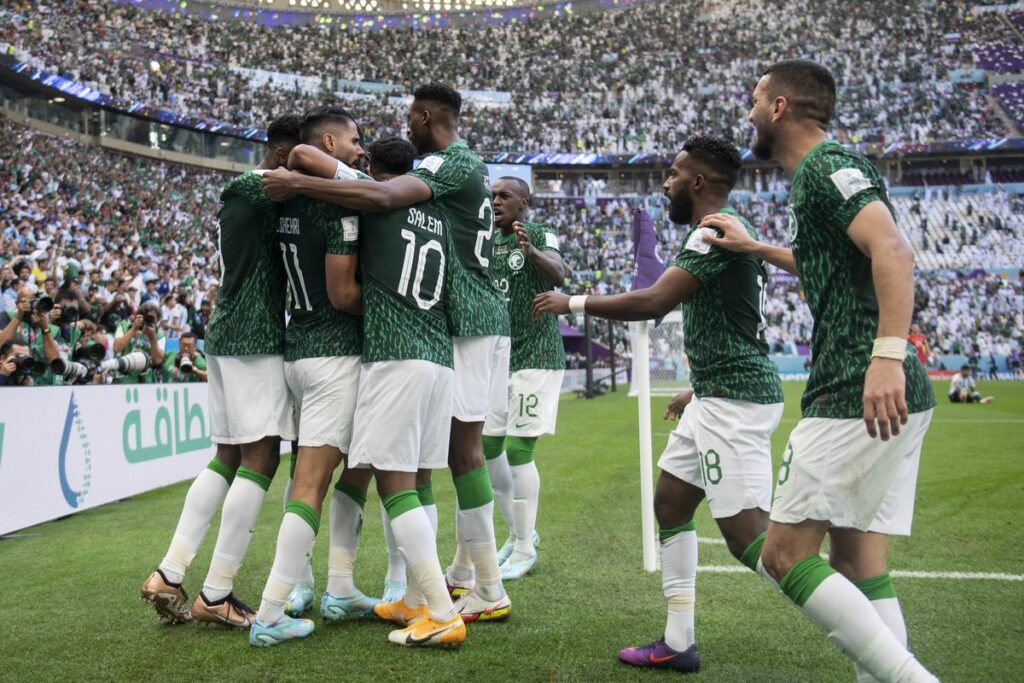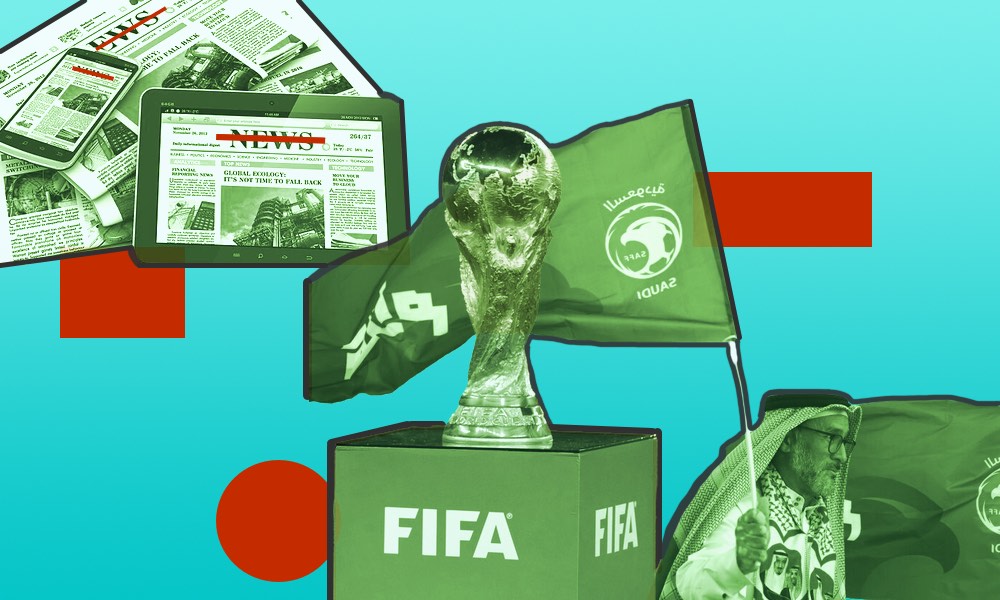|
Listen to this Article (Audio)
|
The announcement that Saudi Arabia will host the 2034 FIFA World Cup has sparked a wave of criticism from legacy media outlets, echoing similar sentiments expressed during the lead-up to the 2022 Qatar World Cup. However, the discourse surrounding this event reveals much about the shifting landscape of media influence and the evolving dynamics of global sports hosting. I look at how legacy media has responded to Saudi Arabia hosting the 2034 World Cup, compare these reactions to the clear success of the Qatar tournament, and explore what this means for the influence and relevance of traditional media.
The Qatar World Cup Precedent
The 2022 Qatar World Cup is often hailed by many sports analysts and fans alike as one of the greatest in history. According to FIFA’s official match statistics, the tournament saw an average of 2.99 goals per game, higher than any World Cup since 1958, marking it as one of the most entertaining in terms of gameplay. The safety records were exemplary, with no reported major incidents involving fans, which was a testament to Qatar’s stringent security measures and hospitality. The architectural marvels of stadiums like Al Bayt and Lusail Iconic Stadium were not only feats of engineering but also cultural symbols, celebrating the Middle Eastern heritage in a modern context.
The Qatar World Cup was the greatest of all time, in every metric possible – quality of the games, to unparalleled safety for fans, to state-of-the-art stadiums, to the opening ceremony.
Now, imagine what Saudi Arabia will do! Congrats, more than well deserved. #Saudi34 pic.twitter.com/7yoZ1JXcVE
— Omar Al Raisi (@Dantani) December 12, 2024
Media Reactions to Saudi Arabia’s 2034 Hosting
Despite the successful precedent set by Qatar, the legacy media’s response to Saudi Arabia’s hosting of the 2034 World Cup has been largely negative, focusing on exaggerated human rights issues, politicized environmental concerns, and allegations of “sportswashing”. Publications like The Guardian, The Times, Daily Mail, BBC and The New York Times have been vocal, with articles framing the decision as “controversial” to say the least. These critiques often fail to mention the potential for cultural exchange and the economic upliftment such events can bring to host nations. It is the same old playbook used by the legacy media whenever a country outside of the western nations are awarded to host a major sporting event.
The Guardian published a piece highlighting the human cost of hosting such an event, predicting dire outcomes for migrant workers, a narrative reminiscent of the pre-Qatar tournament rhetoric.
The New York Times described FIFA’s decision as part of a broader, controversial move by the international body, focusing on the political implications rather than the sporting event itself.
Source: Reuters Institute, Sponsorlytix
The decline in direct access to news websites reflects broader shifts in digital news consumption habits, moving towards platforms like social media, search engines, and aggregators for news discovery.
The Decline of Legacy Media Influence
This reaction from legacy media follows a broader trend of declining influence. A Pew Research Center study from 2023 showed a continued drop in trust towards traditional news outlets, with only 34% of U.S. adults expressing high confidence in their reporting. This trust has been steadily decreasing, particularly among younger demographics who increasingly turn to social media for news, specifically the X platform (previously Twitter), which has stood for truth and free speech since Elon Musk purchased it for $44 Billion.
Saudi Pro League Vs Major League Soccer – Which League Is Better? – Inside Investigation

Despite this decline, legacy media often overestimate their ability to sway public opinion on global events like the World Cup. Their coverage of past events, including the 2022 World Cup, was negative since Qatar was awarded the hosting rights, but did little to dampen the global enthusiasm or attendance and audience viewership. For instance, despite widespread criticism, the Qatar event saw a record-breaking 3.4 million attendees, showcasing the disconnect between media narrative and public sentiment.
The economic impact of the Qatar World Cup was profound, with an estimated GDP increase of about 10% for the host country, driven by infrastructure development and tourism. This economic boost, which could be mirrored or exceeded in Saudi Arabia, is often downplayed or ignored in legacy media narratives, focusing instead on more controversial aspects.
Source: Reuters Institute, Sponsorlytix
The Reuters Institute report indicates a notable decline in traditional news sources, with television news viewership dropping to 34% from 46% since 2018, while the daily readership of print newspapers has fallen sharply to 11% from 23% over the same period.
Saudi Arabia’s Potential for the 2034 World Cup
Saudi Arabia, with its ambitious Vision 2030 plan, aims to diversify its economy and enhance its global image, much like Qatar did. The country has already shown its capability in hosting major sports events, including the Formula 1 Grand Prix, Boxing championship events, UFC and the Dakar Rally. The financial resources and vision for the 2034 World Cup suggest an event that could surpass even the high benchmarks set by Qatar.
Saudi Arabia plans 15 stadiums across five cities, including eight new builds, aiming for futuristic, sustainable designs that could set new standards in sports architecture. Like Qatar, Saudi Arabia has the opportunity to present its rich cultural tapestry to the world, potentially fostering greater cultural understanding and unity, aspects often overlooked by critics.
Uncovering The Dark Underworld Of Illegal Sports Streaming And Piracy

The Need for a New Narrative
As we approach 2034, there’s an urgent need for declining legacy media to change how they report on global events like the World Cup. The constant focus on human rights and environmental issues, while crucial, has been politicized by globalists to serve broader geopolitical agendas, often missing the broader picture of the benefits these mega-events bring. Legacy media’s track record of suppressing factual stories while pushing misleading narratives has significantly eroded public trust across various demographics. This selective outrage can be seen as an attempt to enforce a particular socio-political model globally, under the guise of moral superiority.
Moreover, environmental concerns are sometimes leveraged by globalist entities to push for policies that align with their economic interests. The media narrative around these issues often amplifies stories that serve to critique or pressure countries whose policies don’t align with Western ideals, while downplaying others where similar issues exist. This manipulation shapes public opinion in ways that can serve geopolitical strategies rather than focusing on genuine environmental or human rights improvements
How AI And Computer Vision Technology Is Redefining Sports Analysis And Data

The politicization doesn’t negate the need for addressing real issues but highlights how these can be co-opted for political gain. Human rights, for instance, are used as political leverage, with selective outrage often coinciding with diplomatic or economic strategies. As we move forward, it’s vital for the legacy media to provide a more balanced view, acknowledging the positive impacts of hosting such events alongside the necessary critique, ensuring that coverage reflects a commitment to truth and equity rather than serving as a tool for globalist agendas.
The essence of the World Cup is the celebration of football, a game that unites diverse peoples. The media should focus more on this unity, the sport’s growth, and the joy it brings globally. Events like the World Cup can be platforms for dialogue and change, not just in the host country but globally, through the shared passion for football.

The legacy media’s outcry over Saudi Arabia hosting the 2034 World Cup reflects not just concerns but also a broader struggle to maintain relevance in a changing media landscape. As public trust wanes and citizen journalism along with new individual media platforms rise, traditional outlets must adapt to a narrative that celebrates the positive aspects of global events like the World Cup. Saudi Arabia’s upcoming tournament offers a chance for the world to witness another spectacle of human achievement, cultural exchange, and sporting excellence. Let’s hope that by 2034, the narrative will have shifted towards one of celebration rather than contention, giving credit where it’s due to the host nation for its efforts in showcasing football at its finest.
















